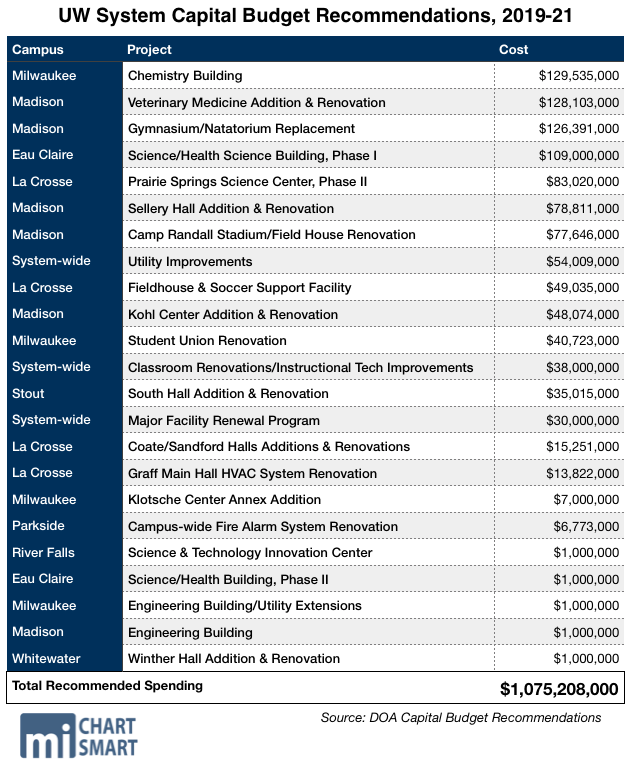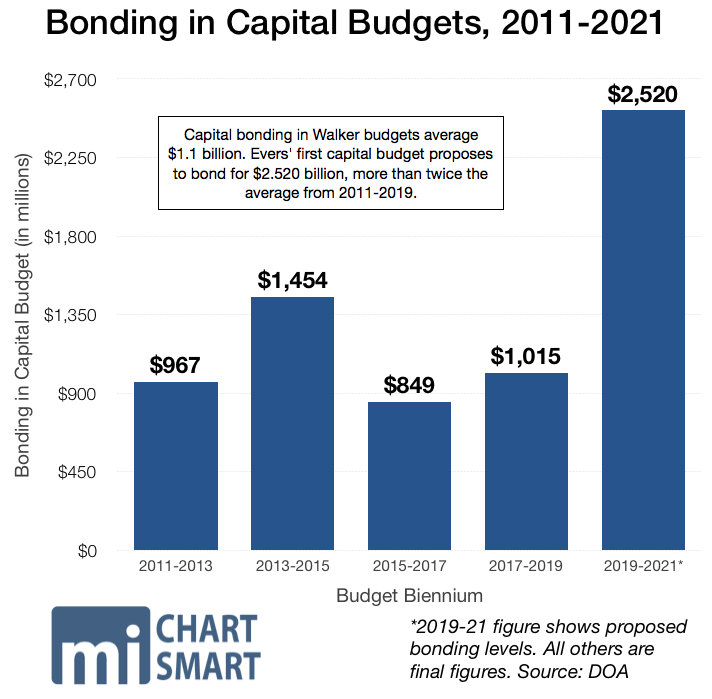 The @UWSystem is the biggest benefactor of the huge $1.9 billion Building Commission budget. The System will be lavished with $1 billion more in borrowing and spending. #wibudget #wipolitics #wiright Click To Tweet
The @UWSystem is the biggest benefactor of the huge $1.9 billion Building Commission budget. The System will be lavished with $1 billion more in borrowing and spending. #wibudget #wipolitics #wiright Click To Tweet
June 12, 2019
By Ola Lisowski
MADISON, Wis. — The Joint Finance Committee (JFC) came one step closer to finishing work on the 2019-21 budget Tuesday, spending $1.88 billion more on building projects. That level of spending notches a new record, exceeding the previous high of $1.7 billion under former Democratic Gov. Jim Doyle.
Republicans agreed to spend and borrow nearly $1.9 billion on statewide building projects Tuesday, blowing away the $1 billion spent on the Building Commission in the last budget.
The party-line 12-4 vote came after three and a half hours of debate. The University of Wisconsin (UW) System will receive the largest portion of the new funding, with $1.026 billion more for buildings across the system.
Gov. Tony Evers had requested $2.5 billion in spending and borrowing in his capital budget. That package increased spending by 2.5 times over the prior budget, which authorized $1 billion in bonding.
The Republican-led Building Commission rejected Evers’ proposal outright in a March vote, calling the largest-ever capital budget “unrealistic and unsustainable.”
Instead, Republicans Tuesday finalized a plan that authorizes nearly $2 billion in borrowing and spending for projects across the state. The package nearly doubles bonding over former Republican Gov. Scott Walker’s last budget, for 2017-19.
Of the $1.88 billion allocated, $1.5 billion is supported by general obligation bonding. The other $376 million comes from gifts, grants, federal money, and other existing funds.
The largest enumeration in the package is $264 million for facility maintenance and repair across all agencies. More than $248 million of that particular provision would be supported by borrowing.
Spending at the UW System comes next on the list, with $1.026 billion enumerated on 40 new projects. Of that, $857 million is supported by general obligation bonding. Evers had proposed spending $1.07 billion on UW building projects.
That means the GOP plan borrows just $45 million, or 4 percent, less than Evers’ proposal for UW. Following weeks of record-high spending packages passing out of the committee, fiscal hawks are likely to raise an eyebrow at the continued spending.
Indeed, Sen. Steve Nass (R-Whitewater) was the first to comment on the package, writing in a press release that “tonight was another win for big spending and a loss for the taxpayers. It is becoming more difficult by the day to vote in favor of the budget in two weeks.”
YES! Massive tax increases and record borrowing from the party of fiscal responsibility. https://t.co/K9RWKawonr
— Adam Jarchow (@AdamJarchow28) June 12, 2019
Republicans can only lose two votes in the Senate for the full budget to pass that chamber.
After the budget vote for the UW System several weeks ago spent less than Evers had proposed, UW System President Ray Cross said that the committee had given him a “kick in the shins.” Speaking during Tuesday’s debate, Rep. Mark Born (R-Beaver Dam) said he had spoken to Cross about the generous building package.
“I hope this helps heal your shins,” Born said he told Cross, who responded “they’re certainly feeling much better.”

Committee co-chair, Rep. John Nygren (R-Marinette) voted for the package, but said the system needs to be seriously changed.
“I want to talk candidly about the building program that we have in the State of Wisconsin. I think it’s broken. I think it’s bad for the taxpayer,” Nygren said. “We have entities that are hiring private lobbyists to lobby on behalf of building projects. It’s broken. But at the same time, I know it needs an influx of investment, and because of that I’m going to be voting for this package.”
He went on to say that university officials have long set their own budgets for projects, assuming the building commission will approve whatever the university asks for. “It’s broken,” he repeated several times, expressing his hope for reform.
While Democrats zeroed in on several projects they had hoped to see enumerated in the plan, including an expansion to Madison’s Alliant Energy Center, they were overall pleasantly surprised with spending levels in the package.
Is this the endorsement fiscal conservatives are going for? Rep. Chris Taylor (D-Madison) tells JFC Republicans she likes "a lot of the things that are funded" in GOP's $1.9 billion building project borrowing plan. #wiright #wipolitics #wibudget
— MacIver Institute (@MacIverWisc) June 11, 2019
“I am very grateful that this governor is pushing you all,” Rep. Chris Taylor (D-Madison) said, thanking Evers for setting the tone for the budget debate. “This governor is pushing you, you’re following his lead, and I’m really glad to see it.”
For their part, Democrats introduced a motion that exactly followed Evers’ proposal for building projects. That would include more than $1 billion in spending and borrowing for the UW System.
The most expensive line item within the Democratic plan would have funded facility maintenance and repair. That would cost $324 million, more than $308 million of which would be borrowed. In the category of building renovations, UW-Milwaukee would receive $130 million in borrowing for a chemistry building and utility extensions. Both projects were included in the final motion, though at slightly different funding levels.
The Democratic motion was turned down on a party-line 4-12 vote after debate.
Originally, the committee was scheduled to take up a tax cut package in addition to the other agency votes, but delayed that vote until Thursday.
Speaking at an event Tuesday, Assembly Speaker Robin Vos (R-Rochester) said Republicans will release their tax plan before Thursday’s executive session. Vos said the package would more than offset revenue increases in the Department of Transportation budget. The DOT budget passed in the first week of June raises spending at DOT by $484 million.
Senate Majority Leader Scott Fitzgerald (R-Juneau) said as much the day before, telling the media that the Republican package would provide approximately $400 million in tax relief.
Republicans passed their own tax plan in January following better-than-expected revenue estimates. Evers vetoed that plan, which would have increased standard deductions by approximately 20 percent for each type of filer.
JFC is expected to complete its work on the budget Thursday morning. Legislative leaders have said that the Senate and Assembly will vote on the full budget during the last week of June, sending the document to Evers before the end of the fiscal year on June 30.
